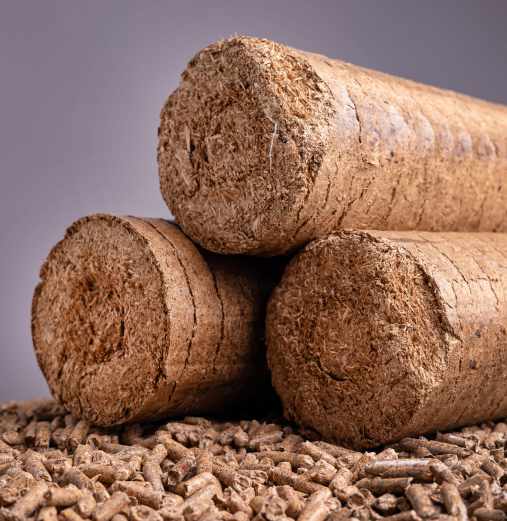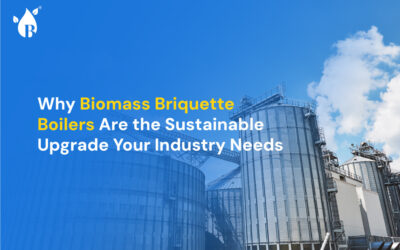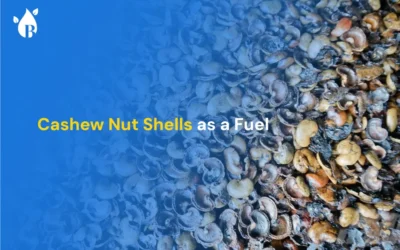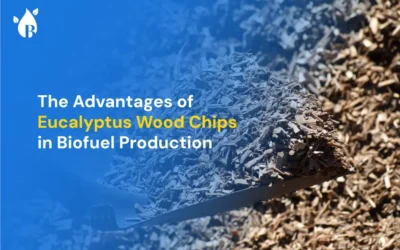
Starting a biomass business can be a rewarding venture. Choosing between biomass briquettes and pellets plays a pivotal role in your startup’s success. Both are sustainable, cost-effective alternatives to fossil fuels, but which one is the better fit for your business needs? This guide will help you make an informed decision based on the key differences, profitability, and market demand for both options.
Biomass Briquettes and Pellets: A Quick Overview
Biomass materials like rice husks, sawdust, coffee husk, woodchips, groundnut husk, peanut husk, and cotton stalks can be compressed into briquettes and pellets. Both are eco-friendly and widely used for cooking, heating, and electricity generation.
These biomass products help reduce carbon emissions and contribute to a more sustainable energy future.
Which is better, pellets or briquettes?
Before analyzing which one is better, it is important to understand the difference between pellets and briquettes.
Composition and Moisture Tolerance
- Briquettes: Made from agricultural and forestry waste, briquettes can handle higher moisture content (15-20%) in the raw materials.
- Pellets: Typically made from finer materials like straw, husks, and sawdust, pellets require a much lower moisture content (7-8%).
Size and Shape
- Pellets: Small cylindrical shapes, 6-8 mm in diameter, often used in small-scale applications like stoves.
- Briquettes: Larger blocks or sticks, 30-40 mm in diameter and over 15 cm in length, best suited for medium to large-scale industrial boilers.
End Use
- Briquettes: Typically used in larger industrial boilers, power plants, and factories.
- Pellets: Commonly used in household stoves and small-scale heating systems, offering greater portability.
Combustion Efficiency
- Pellets: Burn easily and heat up quickly, ideal for systems requiring fast heat generation.
- Briquettes: Burn longer and more efficiently, making them more suitable for long-term, continuous heating.
Is the Briquettes or Pellets Business Profitable for a Startup?
Before evaluating the profitability of the briquette and pellet-making business, look for the following factors.
Raw Material Availability: Is raw material easily accessible in your area? Assess transport costs, moisture content, and the availability of materials like sawdust, rice husks, or woodchips.
Production Costs: What are the electricity and labor costs in your region? Understanding your cost structure will help in determining the feasibility of starting a biomass business.
Market & Logistics: Who is your target audience? Are you catering to domestic clients or looking to expand internationally? Don’t forget to factor in storage and transportation costs. Exporting requires careful attention to exchange rates and shipping logistics.
What is the greatest advantage of briquette over loose biomass burning?
When comparing biomass briquettes and pellets to loose biomass, they offer several key advantages:
Higher Combustion Efficiency: Both briquettes and pellets are densified, which makes them burn longer and more efficiently than loose biomass, helping businesses save on energy costs.
Environmentally Friendly and Cost-Effective: Biomass fuels are renewable and produce fewer emissions than fossil fuels, making them a cleaner energy alternative.
Read this blog also: What is the composition of Biomass Briquettes?
Which Is Better for Your Startup?
Deciding whether biomass briquettes or pellets are better for your startup depends on your specific business goals:
If you’re targeting large-scale industrial applications: Briquettes may be your best option, as they are suited for medium to large boilers and have longer burn times.
If you’re focusing on small-scale, residential, or local markets: Pellets might be a better fit due to their compact size and ease of use in small-scale heating systems.
Final notes
As the world moves toward net-zero emissions, the demand for biomass briquettes and pellets will only grow. They’re cost-effective, sustainable energy sources that can help your startup thrive in a competitive market.
Before you decide, assess your raw material availability, target market, and production costs to make the right decision for your business.



